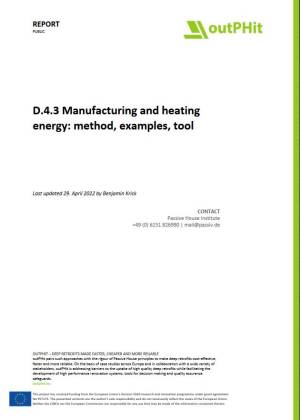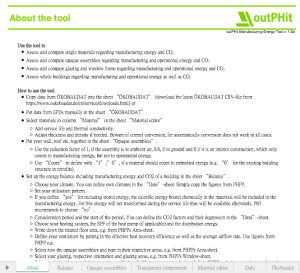This is an old revision of the document!
Table of Contents
outPHit Manufacturing Energy Evaluation Tool (MEET)
Free Download* the Manufacturing Energy Evaluation Tool 2 (MEET 2 beta) | Free Download* the outPHit Manufacturing Energy Evaluation Tool (MEET)
*Note: The download link will take you to the Passive House Portal, where you need to login in order to access the report. Login details to the database may differ from your membership login details to Passipedia. Please sign up to the Passive House Portal in case you don't yet have an account. Registration to the Passive House Portal is free and can be canceled at any time. In case of questions contact info@passivehouse-international.org
 The manufacturing energy influences the overall energy balance of a building. The Manufacturing Energy Evaluation Tool (MEET) was developed to evaluate the potential energy expenditures and greenhouse gas emissions (in CO2 equivalents) that arise during the production of building materials and components, and to compare these with the operational energy of a building. This allows for a comprehensive analysis of both energy forms — manufacturing and operational — within a single tool.
The manufacturing energy influences the overall energy balance of a building. The Manufacturing Energy Evaluation Tool (MEET) was developed to evaluate the potential energy expenditures and greenhouse gas emissions (in CO2 equivalents) that arise during the production of building materials and components, and to compare these with the operational energy of a building. This allows for a comprehensive analysis of both energy forms — manufacturing and operational — within a single tool.
For more information on the calculation methods, please refer to this Passipedia page and the attached report (or click on the image to the right).
MEET: Original Tool
The first version of the tool, along with the report, is available for download above. It is a standalone tool that provides a comprehensive evaluation of the manufacturing energy and the greenhouse gas potential of building materials. Simultaneously, it also approximates the operational energy of the building. It assists in the assessment and comparison of:
- Individual materials
- Window components and opaque assemblies
- Entire buildings under specific climatic conditions
MEET 2: Next Generation of the Tool (beta)
With the introduction of the second version, the tool now offers enhanced functionality and a direct connection to the Passive House Planning Package (PHPP). Specifically, this means:
- Comprehensive Energy Analysis: In addition to heating energy, domestic hot water and cooling energy are now also considered. Thus, any climate within the PHPP can be selected. Optionally, building services can also be evaluated.
- User-Friendly Material Selection: The material input has been improved through an extensive building material list and a filtering mechanism. Additionally, the input for windows and doors has been made more intuitive.
- Integration with PHPP: MEET 2 is linked to PHPP 10, enabling a detailed determination of operational energy. All relevant energy data, as well as data on the composition of the building envelope, are transferred easily using an embedded interface sheet.
As MEET 2 is currently in its beta stage, we invite you to try the tool with your PHPP 10.6 (or higher). Please contact us at tools[at]passiv.de to receive the latest version of the interface sheet. We look forward to your feedback!
Comparison of Operational and Manufacturing Energy
MEET ist ein wertvolles Werkzeug für die ganzheitliche Betrachtung der Energieeffizienz eines Gebäudes. Es unterstützt Planer und Architekten dabei, fundierte Entscheidungen zu treffen, die sowohl die Herstellungs- als auch die Betriebsenergie berücksichtigen.
Das Tool soll auch dabei helfen zu verdeutlichen, dass eine etwas höhere Herstellungsenergie für Produkte mit hohen thermischen Dämmqualitäten nicht zwangsläufig nachteilig ist, da diese oft erhebliche Energieeinsparungen im Betrieb ermöglichen. Denn in der Praxis zeigt sich immer wieder, dass die Betriebsenergie einen entscheidenderen Einfluss auf die Gesamtenergiebilanz eines Gebäudes hat.
Siehe auch
Arbeitskreis kostengünstige Passivhäuser Nr. 58: Energieeffizienz und CO2-Emissionen im Lebenszyklus|Teil 1
Arbeitskreis kostengünstige Passivhäuser Nr. 60: Energieeffizienz und CO2-Emissionen im Lebenszyklus|Teil 2
Kernergebnisse zur Lebenszyklusbilanzierung
Manufacturing energy plays a to be said important role in the overall energy balance of the building. In outPHit, PHI has investigated appropriate methods for assessing both, manufacturing and operation energy and explains this on various examples. Use the developed tool to
- Assess and compare single materials regarding manufacturing energy and CO2
- Assess and compare opaque assemblies regarding manufacturing and operational energy and CO2
- Assess and compare glazing and window frame regarding manufacturing and operational energy and CO2
- Assess whole buildings regarding manufacturing and operational energy as well as CO2
Click Tool to read Passive House tool overview
Further reading on this topic
Life Cycle energy balances, Embodied energy and the Passive House Standard
Webinar: Embodied energy and carbon in Passive House construction ![]()
Adequate net zero rating approach chosen for case study projects




